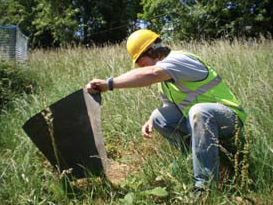If you have a relevant degree or an interest in pursuing a career in ecology, you must consider the direction this could take you. There are a few very different career paths in Ecology. The difference between them is not generally discussed much by ecologists when they’re starting out. I have identified there are three main career paths in ecology that you could work on. I think it is important to recognise this as each path has different requirements for skills and training. Once you choose your path, it will be a lot easier to set your career goals.
All three are very enjoyable, but they differ in the type of challenge they offer. The level of intellectual involvement and maintenance of professional standards. Also, they can differ vastly in salary potential.
Career path No. 1 – Conservation

The first career path in ecology that we will consider is conservation. Conservation jobs are usually for:
- Charities and trusts
- local authorities
- Government organisations,
- Wildlife trusts,
- Small conservation organisations,
- Museums,
- Zoos, and
- Campaigning groups.
You can find jobs in this area both here in the UK and abroad. Our Certificate in Conservation Management will get your career in Conservation off to a great start by developing some key skills and knowledge.
Reserves management is a common conservation career and often involves managing teams or work parties as well as preparing management plans, monitoring wildlife and habitat change, talking to the public and holding events. Some conservation jobs are abroad and may also include a research element.
Other conservation jobs, such as lobbying, public awareness, managing teams of volunteers, and working with schools or visitors to centres, may be more focused on your people skills, your ability to speak publicly, your negotiation skills, and maybe even your command of foreign languages. Each post will have its own unique role and set of skills that you will need to fulfil. This is interesting work but not always well paid and can be dependent on funding. So it can be short-term or relatively insecure.
Career path No. 2 – Academia

Academia is a well-established path you can take after your degree – there is a whole career structure waiting for you and you can pursue jobs literally anywhere in the world. Academics are the ones that do the research that helps everyone in ecology work effectively and make sure that the advice we give has a scientific foundation.
They discover, through their research, what works and what doesn’t in terms of habitat and species management, population structure and much more. They also study species ecology and a myriad of other things, including all the genetics studies that have shed so much light on how species interact and their evolutionary history. This path is based on research but often also includes teaching in universities as well. University structures mean that salaries are capped.
Career path No. 3 – Ecological Consultancy

One of the most popular choices of career paths in ecology is ecological consultancy. Ecological consultants are paid by their clients. These are usually developers. To deliver advice on wildlife and conservation issues which they might have an impact on, usually while they are applying for planning permission or during a development. Projects range from minor barn alterations to new motorways – both would have to take into account their likely impact on wildlife and steps to mitigate impacts.
Their main role is to carry out surveys of the development sites to find out about which species and habitats are present, if any protected species or habitats will be impacted (whilst referring to wildlife legislation) and how to mitigate for any losses. The survey season – April to September – can be very busy with daily surveys and report writing.
Ecological consultants are also heavily involved in major strategic projects such as the London Olympics, Severn barrage, wind farms, new towns and high-speed rail links. The ecological surveys and mitigation projects can sometimes take many years to complete or resolve.
Ecologists are also often involved in habitat creation and re-creation, ongoing site management and monitoring, mitigating for habitat loss and assessing the environmental impacts of a project on the ecology of a site.
There is a clear career progression as skills are gained. Pay is good, and there are also opportunities to become self-employed or set up your own consultancy where earnings are potentially significant. Our Certificate in Ecological Consultancy is the perfect starting point for your career after gaining a relevant degree.
I hope this has helped you to consider your own career paths in ecology. There are plenty of options, and each one can be customised to your own priorities and wishes.
Sue Searle
Principal Ecologist
Ecology Training UK Ltd
If you want to know more about ecological consultancy then why not get Sue’s book ‘How to Become an Ecological Consultant’ 3rd Edition. Or as a PDF from our shop.
If you are interested in conservation can we suggest you go to Conservation Careers to find out more. https://www.conservation-careers.com/



